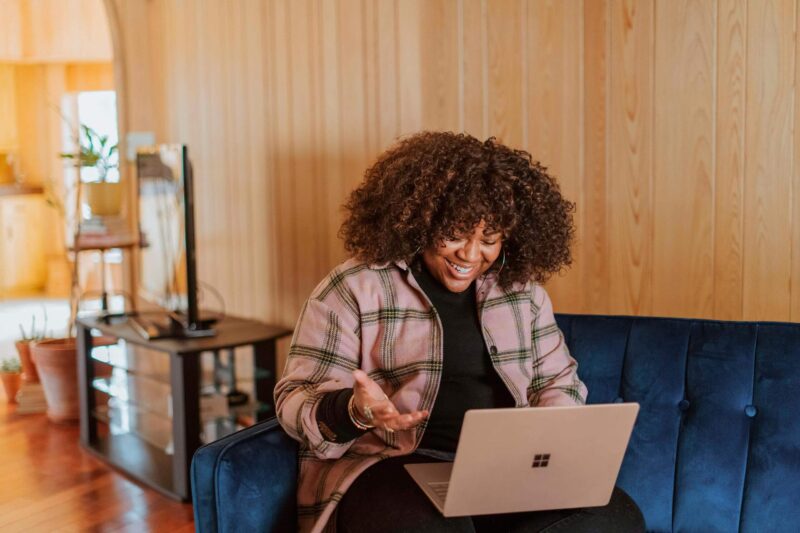A Guide to Virtual Property Viewings
Virtual viewings. Two words that reverberated around the UK housing market during the first lockdown.
Even with the majority of property transactions on hold, moves that were permitted mostly started with a virtual viewing.
Now that people can physically view properties again, many are wondering what role virtual viewings will play in the market going forward. With social distancing still a necessity, however, viewing a property without actually visiting it will likely stick around for a bit longer.
But what happens when social distancing is no longer needed? Will virtual viewings become a necessary component for renting a home? Or will they end up being a short-term fad?

What are the different types of virtual property viewings?
In layman’s terms, a virtual viewing means seeing a property without physically visiting it. You may have also heard the terms “video viewing” and “video walkthrough”. That’s because virtual viewings come in varying forms.
Video viewings
The most common type, a video viewing lets you watch a pre-recorded video of the property. You’ll be able to see detailed clips of each room to get a better idea of what it’s like to live there.
3D viewings
3D technology gives viewers the option of looking at a property three dimensionally. You can click on each room and drag your mouse/trackpad to get a different perspective of the home.
Walkthroughs
Walkthroughs often include a narrator (typically the landlord or agent) going around the property and highlighting specific parts that may be of interest to the renter. These occasionally take place live via a video call.
What are the benefits of virtual property viewings?
During social distancing, the benefits of virtual viewings are clear. As a result, their stock has risen considerably with an increasing number of renters favouring a virtual viewing to get things started.
Zero risk of catching (or passing) the virus
There’s zero risk of passing on the virus if people are viewing a property remotely, from an entirely different location. But even without the risk of Covid-19, virtual viewings can still prove useful.
Instant offers and faster turnaround times
If a renter decides they want to move in after seeing a property via video, they can make an instant offer instantly – especially if they’re using a platform that facilitates such actions. With no back and forth arranging dates for physical viewings, the time it takes to rent a home could be cut down significantly.
A step in the right direction for technology
Virtual viewings signify forward-thinking technology. With the majority of modern-day renters tech-friendly, it’s more likely they will embrace ways that speed up the renting process and therefore will be receptive to virtual viewings.
What are the drawbacks of virtual property viewings?
On paper, virtual viewings sound perfect. But we might not be at a place where they’re ready to replace the physical property viewing for good. There are some negatives that hold virtual viewing back.
Virtual viewings can’t replicate the real thing
It’s hard to argue against a physical viewing when it comes to really capturing the feel somewhere. There’s no substitute for walking around a property and experiencing it first hand.
You can’t get a feel for the neighbourhood
There’s also the local area to think about. More often than not, renters get a feel of whether they want to move into a property as soon as they arrive in the neighbourhood. Virtual viewings don’t allow for a true experience of the area before seeing the property.
Virtual viewings might not work with all property types
Renters may be more inclined to move into a brand-new property via a virtual viewing. But the charms and quirks of older homes (even ones that have been refurbished) can get lost in a video walkthrough, and renters will be more likely to want a physical viewing.

Will virtual viewings stick around for the long term in the property market?
Ok, so renters might not be flocking in their droves to rent a home after viewing it virtually. But video still has an important role to play in the future of the property market, and it looks like virtual walkthroughs could be here to stay.
The ability to view a place via video before going on a physical viewing should separate casual property searchers from those who are serious about moving home. The result could save plenty of time for landlords.
If you know that renters who request a physical viewing have already seen photos and a detailed video of your home, you can be more confident that they’re genuinely interested in your property. That alone is a good enough reason for virtual viewings to stick around for the long term.
Virtual property viewings with Mashroom
The best way to let your property is by providing renters with real-life viewings where an expert can tell them about the home and local area – and no one is better suited to do that than your current tenant. That’s why Mashroom offers Tenant Team Up, where you can work with your outgoing tenant to find a new renter.
Yet, it’s always worth giving potential new tenants as much information about your property beforehand. When you are listing with Mashroom, you can upload videos of your property and provide interested renters with in-depth virtual viewings.
Choice is the key. And by offering real-life viewings and virtual ones, you’re providing renters with options when it comes to finding a new home. Physical viewings might be irreplaceable. But virtual viewings have a long-term role to play.